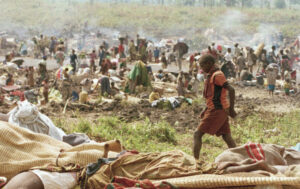
CHICAGO (BP)–In 1935, a young woman gave birth to a little boy at Chicago’s Cook County Hospital. Five years later, his mother died. At age 8, the boy knew God wanted him to preach. Today, that boy is a pastor in Chicago and president of Illinois Baptist State Association.
Illinois Baptists elected Eugene Gibson Sr., 61, as president last November. He became the second African American to hold the position. Another Chicago pastor, Don Sharp, was the first in 1982.
Gibson felt God’s call to preach early in life, but he did not answer it for nearly 30 years.
After his mother’s death, Gibson was raised by his grandparents. His grandfather, Julius R. Gibson, was a minister in an “ultra-conservative” holiness church, and the youngster was exposed to — and rebelled against — what he now calls “a thousand and one don’ts.”
He felt the call to preach, but “I didn’t want to preach because of my rebellion,” Gibson told the Illinois Baptist newsjournal.
After graduating from school, he experienced success in the business world, becoming the first African American data processing manager for Speigel Inc., where he managed 700 employees.
That came to an end, and Gibson then spent 10 years as a mortician.
In both careers, “God just put blockers in my way” that kept him from continuing, Gibson said.
By age 34, he had experienced “a lot of ups and downs … a lot of mistakes,” and God finally “corralled” him, and Gibson accepted the call to preach.
About the same time, he and Mildred were married in 1970, and today they have four grown children, William, Everette, Eugene Jr. and Eugenia.
Gibson’s first pastorate was at Chicago’s Cathedral of Love Baptist Church. Seven years later, in 1977, he organized Mission of Faith Baptist Church, where he remains pastor. The church started in a southside funeral home then moved to its own building, a historic landmark, in 1978.
“We’ve been Southern Baptist ever since we’ve been a church,” Gibson said. “I got an invitation from Don Sharp,” and that led him to “look at the history of the Southern Baptist Convention” and how it had related to blacks. Gibson said he “didn’t like that at all.”
But: “The reason I came in was because of the Christian education program. That was the only reason. … I felt the positive outweighed the negative … because I wanted my church to have a strong, strong Christian education background.”
Twenty years later, he is president of the Illinois organization of Southern Baptists.
“In a lot of ways, we’ve come a long way, but in some ways we’re still where we used to be,” Gibson said.
In his native state, he noted a “seemingly insurmountable gap between southern Illinois and northern Illinois.” And he believes some of that is a carryover from the “political arena in the secular world,” involving Democrats and Republicans.
During his time as IBSA president, Gibson said he would like to see a new closeness develop between the northern and southern parts of the state. That can be accomplished if Illinois Baptists “start fearing God and not man,” he said, referring to a sermon by Henry Blackaby at a regional Baptist rally in Chicago in January. Baptists need to “do what God wants them to do and not worrying about what’s popular or acceptable to man,” Gibson said.
Some have questioned privately the level of Cooperative Program giving by Mission of Faith Baptist Church. Gibson responded that the church gives 10 percent of its budget, “a tithe,” to mission causes. That total includes about 6 percent or 7 percent, which goes through the Cooperative Program, the primary financial channel for Southern Baptist ministries in Illinois and around the world.
Other people “can think what they want,” Gibson said. “Each church is autonomous. Each church decides how much it wants to give to whatever, and no outside force can change that. That’s their decision.” He added “there have been presidents of the Southern Baptist Convention whose churches did not give” what some have considered an adequate amount.
Gibson noted last year Mission of Faith fed 12,000 homeless people and another 5,000 hungry people. The church helped others who had been burned out or turned out of their homes. They bought clothes and toys for seven families at Christmas. And they sent more than $2,000 to feed the hungry in the African nation of Rwanda.
Every church should give what it can through the Cooperative Program, Gibson said. “I think the Cooperative Program is very effective; … however, to whom much is given, much is required. … People should give what they can. It’s not equal gifts, it’s equal sacrifice.”
During his time as president, Gibson hopes to see a coming together of Illinois Baptists. “Let us love more. We only have a short time really to love,” he said. “Let us be more forgiving. Let us be mindful of kingdom building. In the final analysis, only what we do for Christ is going to last.”
–30–














